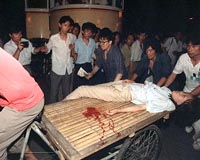 |
Washington (AFP) June 2, 2009 Twenty years after the Tiananmen crackdown prompted vows to shun "the Butchers of Beijing," China is enjoying global clout like never before as its giant economy proves irresistible. The global economic crisis has even turned the tables to an extent, with China, long on the receiving side of criticism, now pressing the United States on the safety of its nearly 800 billion dollars invested in US debt. The United States and the European Union maintain restrictions on selling arms to China, but Western powers were re-engaging Beijing within months of its 1989 clampdown. China has also been busy making allies elsewhere in the world. Former US president Bill Clinton -- whose election campaign had pledged a hard line on the "Butchers of Beijing" -- delinked human rights from trade with China and traveled to Beijing for a red-carpet welcome in Tiananmen Square. Under current President Barack Obama, Secretary of State Hillary Clinton made clear from the start that human rights concerns would not stand in the way of cooperation with China in other areas, such as the economy. Even House Speaker Nancy Pelosi -- an outspoken champion of human rights and Tibet who in 1991 unfurled a banner in Tiananmen Square "to those who died for democracy in China" -- made only a passing reference to rights on a visit to China last week focused on climate change. John Delury, associate director of the Asia Society's Center on US-China Relations, said the United States saw a need to work with China on a range of issues -- the economic crisis, climate change, North Korea -- and did not want to lose political capital pushing human rights. China's extraordinary economic growth -- and the vast array of US businesses that have come to rely on it -- have also made human rights less of a priority for Washington. "In this sense, Americans accepted the same post-Tiananmen 'social contract' with the Chinese government as did the Chinese themselves -- stay away from democracy agitation, but Beijing will deliver economic growth," Delury said. T. Kumar, the Asia advocacy director for Amnesty International USA, said a key shift came after the September 11, 2001 attacks, which defined the US goal as fighting "terrorism" and led US policymakers to see China, whatever its democratic shortcomings, as a critical partner. "They can talk strongly about human rights in Burma -- or human rights domestically, like closing down Guantanamo -- but when it comes to China, it's different due to strategic reasons," Kumar said. He urged Obama to meet some of the leaders of the Tiananmen pro-democracy protests who are visiting Washington for the anniversary. "This is key not only for the human rights community but for the memory of the hundreds or thousands of people killed in Tiananmen Square," he said. Randy Schriver, a senior State Department official under former president George W. Bush, said the fallout from the Tiananmen clampdown also left lingering mistrust in Beijing about cooperating too closely with the West. "People who were previously champions of the US relationship had their careers ruined for sticking out their necks too far within the Chinese Communist Party or within their ministries. There is still a serious hangover," said Schriver, now a partner at the Armitage Associates consulting firm. But the Tiananmen crackdown's most lasting legacy, he said, may be that Beijing learned how quickly it could overcome international pariah status. "In Western eyes, we would be quick to say that this was not only a tragic incident but a horrible mistake when thinking about the (political) costs," he said. "But I think from the Chinese Communist Party's view, they think they came out of it pretty well," he said. "They grew confident that if they ever need to do this kind of thing in the future -- it's not preferable and they wouldn't necessarily look forward to dealing with the international fallout, but they can weather it." Share This Article With Planet Earth
Related Links China News from SinoDaily.com
 Tiananmen: A bereaved mother's never-ending pain
Tiananmen: A bereaved mother's never-ending painBeijing (AFP) June 2, 2009 Twenty years on, Ding Zilin's pain is still as raw as it was when her son was shot through the heart in the army crackdown on Tiananmen Square protesters in China -- an event that she says broke her. Jiang Jielian, 17, had been a keen participant in the seven weeks of pro-democracy demonstrations in Beijing in the spring of 1989 and, ignoring a curfew imposed by Ding on the evening of June 3 ... read more |
|
| The content herein, unless otherwise known to be public domain, are Copyright 1995-2009 - SpaceDaily. AFP and UPI Wire Stories are copyright Agence France-Presse and United Press International. ESA Portal Reports are copyright European Space Agency. All NASA sourced material is public domain. Additional copyrights may apply in whole or part to other bona fide parties. Advertising does not imply endorsement,agreement or approval of any opinions, statements or information provided by SpaceDaily on any Web page published or hosted by SpaceDaily. Privacy Statement |